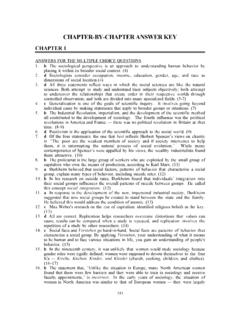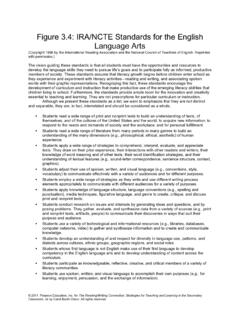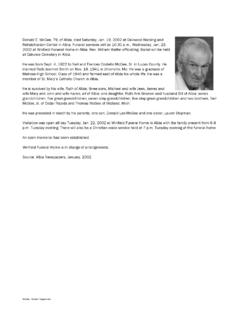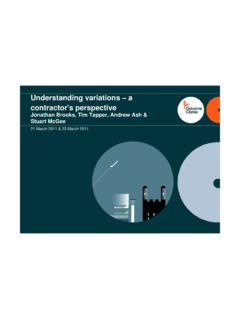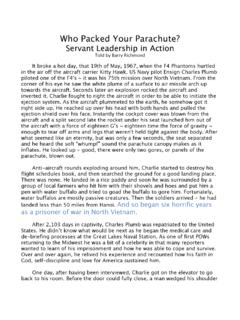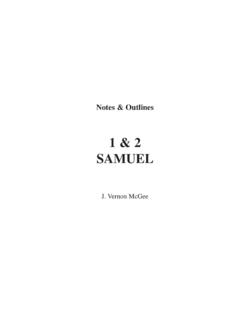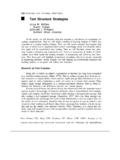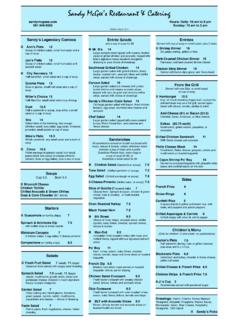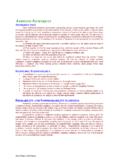Transcription of Analyzing Literature - wps.ablongman.com
1 Analyzing Literature A Guide for Students Sharon James mcgee Kansas State University-Salina Analyzing Literature : A GUIDE FOR STUDENTS. Thinking about the Genre ..1. Strategies for Reading a Work of Literature ..4. Terms for Analyzing For Practice ..7. Yours by Mary Robison ..7. For Critical Inquiry ..10. Working To Have Sex or Not to Have Sex by Krista Williams ..11. Looking at the Analysis ..23. For Critical Inquiry ..23. Call to Write: Responding to Writing Exploring Your Topic ..24. Exercise ..24. Exercise ..25. Cultural and Historical Other Perspectives for Analyzing Exercise ..27. Going Planning ..27. Developing a Exercise ..28. Arranging Your Exercise ..28. Exercise ..29. Working Paragraph Development: Sandwiching Citing from Literary Texts.
2 30. Peer Revising ..35. Connections and Coherence ..36. Writing a Literary Analysis Paper as an In-Class Assignment ..37. Preparing to Writing a Good In-Class Literary Sample Essay by Carolyn After Apple Picking by Robert To Autumn by John Because I could not stop for Death ..43. Looking at the Genre of In-Class Literary Analysis ..44. Writing Closing Note ..45. Analyzing Literature : A GUIDE FOR. STUDENTS. THINKING ABOUT THE GENRE. Literary analysis is a genre that in many ways resembles an argument: you make a claim about the work and support your claim with evidence from the text as well as reasoning and analysis. The purpose of a response to Literature is to persuade the readers that your analysis and interpretation of the work are valid, reasonable, and logical.
3 When you write about Literature , you participate actively in the construction of knowledge about the text. That is to say, the text itself creates only part of its message. The writer of the work has done his or her part to convey its meaning by using symbols, language, setting, plot, character, foreshadowing, and the like, to suggest the text's message. Unlike hard sciences, however, Literature cannot be empirically tested in the laboratory; its meaning comes from its readers. In fact, Literature begs for readers to read, react to, think about, and interpret the text. Having engaged in those steps, the process continues with another step: communicating to others the meaning you, as a reader, have constructed from the text.
4 Your interpretation and analysis, then, add to the body of meaning about the text. Most likely, you have been asked to write about Literature before: perhaps you've read a book and written a report or review of it for your junior high English class; perhaps you've studied an author and researched his or her life and work; perhaps you've read a piece of Literature and answered essay questions about it on an essay exam. Because Literature is a focus of many English classes, it is likely that you have had some experience with reading and responding to Literature in your past academic life; in the university, you will also read and respond to Literature even if you're not planning to major in English. Since many colleges and universities require their students to take a Literature or humanities elective, you will probably continue reading and responding to Literature in college.
5 1. As a genre, literary analysis differs from other types of writing you may have done about Literature , such as an evaluation. For instance, as an assignment for school, you may have watched a play or read a story and had to write a review of it. A review calls upon the writer to make an evaluation, to describe and analyze the work in question. The purpose of writing a review is to persuade the readers that your evaluation, which is based on criteria, is a sound assessment of the work. ( Don't read this book because it lacks a clear plot. ) For example, you can find reviews of books and music printed at online bookstores such as Here people who have read the book (or listened to the CD) provide their evaluation of the work to potential book or music buyers to help them make informed decisions.
6 With literary analysis, however, the focus is not on offering your opinion about the work; rather, the focus is to interpret and analyze the text. Certainly, you offer your informed opinion of the text's interpretation, but you do not assess the merits of the text or tell readers whether or not you liked the work. Literary analysis, then, tends to be more objective than a review might be. For that reason, literary analyses are written using third person pronouns. Other features of literary analysis include a clearly stated thesis (often called a claim) that is supported by reasons and evidence from the text. Writers use present tense verbs to discuss the work rather than past tense. Why do schools put emphasis on Literature ?
7 First, Literature is a way to experience a way of life, a time period, a culture, an emotion, a deed, an event that you are not otherwise able, willing (as, say, in the case of murder), or capable of encountering in any other manner. Literature , then, opens doors to new and different life experiences. Second, the critical reading skills that you bring to reading short stories, poems, novels, plays, as well as non-fiction, are the same types of critical reading strategies that serve you well in any other type of reading that you do whether it be reading a computer manual, a biology text, a legal document, or the like. In order to write well about Literature , you must be able to read the text closely, looking at its structure, the words the author has chosen, the characters' motivations, the patterns of language and literary devices.
8 Certainly, you don't read a biology text looking for 2. literary devices and uses of language; rather, you read that text searching for an understanding of the structure of the interaction within an organism, how the organism relates to other organisms, the biochemical pathways involved in those interactions. However, in either case reading a piece of Literature or a technical document you read closely and carefully, looking at not only what the writer is saying, but also looking at why it's being said and how it's being said. Furthermore, the critical reading strategies that you employ in reading Literature heighten your sense of observation and draw upon your life skills. For instance, as you read a literary text and notice the characters, you have to think about and respond to each character's motivation.
9 (Why did she do that? What makes her tick ?) Reading Literature , then, enhances your critical reading skills. Likewise, being able to write about Literature demonstrates your ability to read critically and engage in the higher level thinking skills of analysis and interpretation. However, it is unlikely that you will write a literary analysis paper outside of a classroom. Literary analyses tend to be only a school assignment for most people (unless you work for The New Yorker or other literary type magazines). On the other hand, the skills that you bring both to Analyzing Literature and writing about it are applicable to situations outside the classroom and to other writing assignments within the classroom. Being able to construct a reasonable claim, supported by evidence and logic, is essential to many other types of expository writing tasks (as you can see from the types of writing in this text).
10 Regardless of the writing task or audience, it is essential to be able to communicate your ideas clearly and effectively, whether you're writing a feasibility report for your boss or a literary analysis paper for your teacher. Often, students are intimidated when it comes to writing about Literature because they feel that they do not know enough about Literature to write about it or that the author is surely hiding some meaning in the text that they just can't find. It is important, though, to keep in mind that readers are integral to making meaning with literary texts. Readers complete the writer's work, bringing their own life experiences and ideas to it to make meaning. Sometimes students feel as if the whole purpose of writing about Literature is to be critical of the work and that's difficult to do if you happen to really like the work.



